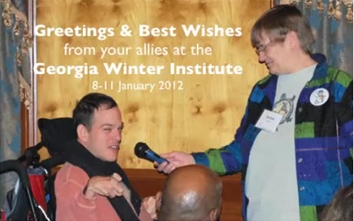Georgia Winter Institute Hosted by the Center for Leadership in Disability (GA UCEDD)
March 30, 2012

|
Nestled in the Georgia Mountains, over 130 people came from across the state to participate in the 2nd Annual Georgia Winter Institute (GWI). The recharging retreat was hosted in Dahlonega, Georgia from January 8th to the 11th, 2012 by the Center for Leadership in Disability and CLD'S developmental disabilities federal partners. People with disabilities and their families, policy makers, community organizers, support care workers and providers converged to strategize community building methods inclusive of disability using principles of person-centered planning. This mix of attendees helped GWI far exceed the mission of connecting community members with and without disabilities to work together to nurture the use of their gifts and strengthen community bonds.
Along with an incredible schedule of presenters and activities, Executive Director of Chatham-Savannah Citizen Advocacy and author, Tom Kohler, shared the annual GWI reading of Waddie Welcome. Among the many lessons the book offers and are infused into the format of GWI, Waddie teaches us the importance to keep the 'social' in 'social justice' and GWI delivered that message with fantastic dances, bands and other fun to close each day.
Notable featured speakers from around the nation each lead four core sessions in the span of two days, providing participants the opportunity to either delve deeply into one topic or experience a taste of each by rotating through the topics. Bruce Anderson, co-manager of Community Activators, shared his immense expertise on storytelling and creating welcoming cultures. Mark Crenshaw and Stacey Harwell, faith-based leaders in Georgia, lead discussions on how to promote inclusion of people with disabilities in faith organizations and activities. John O'Brien, renowned author and community organizer who has traveled the world promoting and engaging in knowledge exchange about person-centered planning, taught how to infuse community organizing efforts with values based approach rooted in person-centered philosophies. Connie Lyle O'Brien, also traveled and known throughout the world, not only taught the importance of these tools but also demonstrated how to use person-centered planning by teaching participants how to write a futures plan. DeAmon Harges and Caitlin Childs, from Indianapolis and Atlanta respectively, explored how to engage in intentional listening within community settings to find and leverage the gifts that each person has. In their fourth session on the topic, Harges and Childs lead a roving listening tour in the downtown area of Dahlonega to speak to local community members about their gifts and ways they could use their gifts to enhance their community.
GWI 2012 added to the enriching experience of GWI 2011 by implementing a focus on the importance of youth advocacy. Jessie Coleman shared incredible stories of her youth advocacy work with the civil rights movement, where she worked alongside Martin Luther King, Jr. and other prominent leaders. To allow the participants to put themselves in the shoes of activists like her for a moment, Coleman asked participants to dress up like the young protesters who knew they would be arrested for expressing their passion for integration and had them stand in a jail cell sized square demarcated on the floor. The experience proved powerful for all participants. Dottie Adams and Susanna Miller applied the lessons extolled by Coleman by creating a plan to promote capacity and leadership building among youth to promote disability inclusion and empowerment in Georgia.
Attendee evaluations asserted a great level of satisfaction with the expanded schedule from two days last year to three days and additional topical focus. Many spoke of how invigorating and truly powerful the GWI experience was for them. Adding to the impressive list of speakers was an open topic chart - which allows participants to share their gifts or areas of expertise by posting a time and meeting location on a schedule wall. Each of these sessions, known as fireside chats, were as diverse as the group of people in attendance. Notable fireside chats included sessions on: leveraging social media to mobilize and engage community organizers, sexual health and disability, promotion of food justice (i.e. working to make farmers markets and other outlets for healthy food accessible to all in the community, regardless of urban living) and moving beyond paternalism toward an ethos of disability justice. The fireside chats allowed participants to seek out material tailored to their specific interests and involve participants as leaders.
Other highlights of GWI were the Affirmation and Haiku Walls. Registrants were asked to put their name on large five by seven post-it notes, which were arranged alphabetically on wall space labeled the Affirmation Wall. Throughout the event, others were asked to put one or two word descriptions of their thoughts on the individuals named on the wall from interacting with each other. This was a great success, as it gave people tangible take-home gifts of how their presence enriched GWI and fellow GWI participants. The Haiku Wall proved to be a welcomed challenge. People loved the opportunity to share their GWI experience in the art form of a haiku poem. Two haikus from the weekend are listed below.
Winter winds, wet leaves
Eager minds, open hearts unite
Hope grew to change lives!
Coming together,
Building a better Georgia,
Winter Institute!
To learn more about GWI and remain informed about the upcoming GWI January 2013, please 'like' the GWI Facebook page. Enjoy photos from GWI 2012 with a bit of the featured entertainment playing in the background.







